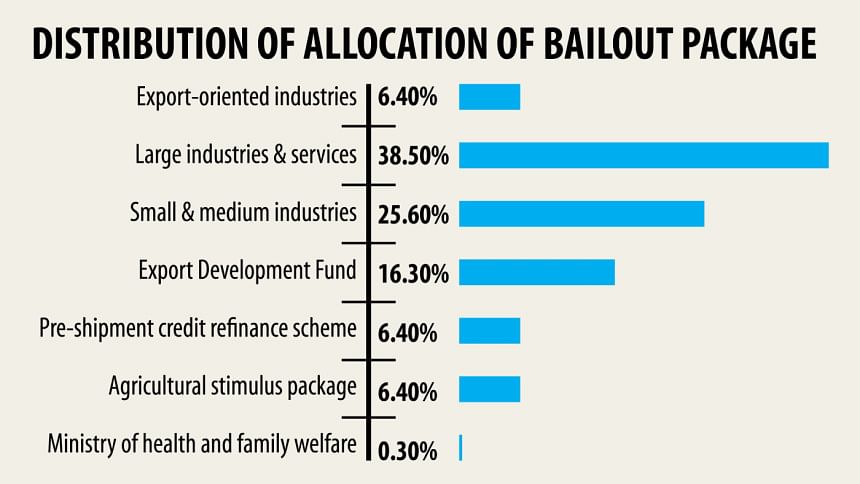Give Tk 30,000cr in cash to poor, get six times more benefit

The Centre for Policy Dialogue (CPD) yesterday suggested the government provide Tk 30,000 crore in direct cash transfer to 1.9 crore poor and vulnerable families to save them from hunger during the shutdown.
The civil society think-tank proposed Tk 8,000 to each of the households for two months, a move that will create domestic demand for goods and services of Tk 186,500 crore in the economy, stimulating local small business activities.
"This will also be an indirect stimulus for the large businesses involved in the supply of essential commodities," said CPD Senior Research Fellow Towfiqul Islam Khan while placing the proposal during a virtual media briefing.
Chances of the economy overheating due to the new cash injection is low, he said.
The think-tank organised the briefing to present its initial assessment of the government's interventions and proposals for food and income security of the marginalised people.
The recommendations came at a time when the cries of the poor and the vulnerable are getting louder and their queue to get rice at Tk 10 a kilogram becoming longer.
The proposal to provide Tk 30,000 crore in support is not more than the money the government has committed for the large industries.
"This support is necessary to protect the poor and the vulnerable and steps should be taken now," said CPD Executive Director Fahmida Khatun.
The think-tank proposed providing the cash support on a weekly basis so that errors in listing could be corrected in case those who are not eligible get listed.
The cash transfer to the families will cover 7.5 crore out of 16.6 crore population based on the latest Labour Force Survey 2016-17 data.
The CPD considered day labourers, employees who get payment on a daily or weekly basis and the self-employed for the support and excluded employers and salaried population.
The largest industries that are relatively more capable of dealing with the shocks are getting the greatest support, it said.
"There is no direct transfer of funds from the government to the workers. There is no explicit allocation made for the vulnerable groups who are the farthest behind and will be the hardest hit by the pandemic."
The informal sector accounts for 85 per cent of the total employed population and they are among the most vulnerable.
"It is widely acknowledged that the lockdown's strategy will only be successful if the state is able to protect its lower income population from hunger and provide food security to them."
According to the CPD, 18.9 per cent of the 1.90 crore households live in urban areas.
If the 1.90 crore families could not be covered, the civil society body offers a second proposal: providing cash to 1.70 crore households covering 6.84 crore of the population.
It would cost the country 0.9-1.0 per cent of the GDP.
To avoid corruption and leakages in the proposed programme, it suggested that an in-built technology-induced mechanism be put in place to ensure minimum leakages and avoid selection bias concerning beneficiaries.
Therefore, the list of programme beneficiaries must be published through websites with other key details, including addresses and phone numbers.
For the maximum utilisation of the support measures for the social safety net programme beneficiaries, a strong effort from non-government organisations and local bodies is needed to make the selection and distribution transparent.
The government must devise a strategy in collaboration with entrepreneurs and labour leaders to ensure production of food and processed and manufactured items such as food products, medicines and medical equipment by selectively keeping factories and enterprises open.
"Health precautions and safety measures must be ensured in this regard."
It is also critical to assess the stock of import-dependent essential commodities and accordingly prepare back-up plans on imports in the near future.
The government will also need to engage with South Asian regional leaders and global leaders to avoid restrictions on the trade of essential commodities, the CPD said.
The government will also need to pursue a more expansionary fiscal approach to boost domestic demand.
To ease pressure on public expenditure, the government needs to identify the expenses that can be deferred. Loans and recapitalisation to state-owned enterprises should be de-prioritised, it said.
CPD Distinguished Fellow Mustafizur Rahman and Research Director Khondaker Golam Moazzem also took part in the briefing.

 For all latest news, follow The Daily Star's Google News channel.
For all latest news, follow The Daily Star's Google News channel. 



Comments